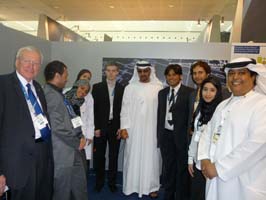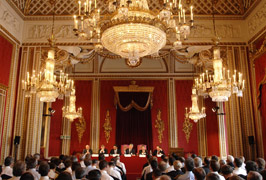
Professor Fred Moavenzadeh Is Appointed President of Masdar Institute
Masdar Institute of Science and Technology has appointed Professor Fred Moavenzadeh from the Massachusetts Institute of Technology (MIT) as its President. Professor Moavenzadeh, James Mason Crafts Professor of Engineering and Director of the Technology and Development program at MIT, will support the institute’s mandate of transforming the emirate into a leading source of advanced technologies and highly skilled human capital.
Masdar Institute Press Release (PDF) >
Professor Ernie Moniz Speaks at Lecture Hosted by Masdar Institute
Speaking at a public lecture hosted by Masdar Instite of Science and Technology entitled "Clean Energy Technology and Policy: A Post-Copenhagen View", Professor Moniz, Director of the MIT Energy Initiative, commended Abu Dhabi and the Masdar Institute for their visionary approach towards a strong knowledge and resource- based economy.
MIT Terrascope Class Visits Abu Dhabi and Masdar Institute 
Terrascope is a learning program for MIT freshman. This year the class was charged with developing a comprehensive plan to deal with the global rise in CO2 and other greenhouse gases. For spring break 2010, the class traveled to the United Arab Emirates to explore Abu Dhabi’s efforts in the capture and storage of CO₂ and to gain practical knowledge in carbon sequestration.The study tour has included lectures presented by Masdar Executives and Masdar Institute faculty, as well as visits to various sites at Masdar City where testing of renewable energy technologies is taking place.
MIT Delegation Attends World Future Energy Summit 2010
January 18 - 21, 2010
A delegation of MIT faculty and staff attended the World Future His Highness Sheikh Mohammed bin Zayed Al Nahyan, Crown Prince of Abu Dhabi and Deputy Supreme Commander of the UAE Armed Forces visiting the Masdar Institute booth and speaking with Masdar Institute Professor Amal Abdulla Al Ghaferi and other Masdar faculty, staff, and students. |
His Highness Sheikh Mohammed bin Zayed Al Nahyan, Crown Prince of Abu Dhabi and Deputy Supreme |
MIT President Susan Hockfield Zayed Future Energy Prize Jury Member 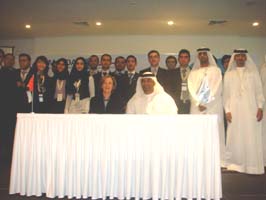
November 2009
MIT President Susan Hockfield visited Abu Dhabi in late November 2009 in her official capacity as
a jury member of the Zayed Future Energy Prize (ZFEP). President Hockfield and the rest of the ZFEP panel gathered to determine the finalists of ZFEP. President Hockfield also met with His Highness Sheikh Mohammed bin Zayed Al Nahyan, Crown Prince of Abu Dhabi and Deputy Supreme
Commander of the UAE Armed Forces, and His Excellency Sheikh Nahayan Mabarak Al Nahayan, Minister of Higher Education and Scientific Research.
(Pictured at right Dr. Hockfield and Dr. Al Jaber with Masdar Institute students earlier in 2009)
MIT Provost Rafael Reif Attends Masdar Institute Board Meeting and MIT Arab Alumni Association Conference
November 8- 9, 2009
On November 8, 2009 MIT Provost Rafael participated in the Masdar Institute's Board Meeting in Abu Dhabi. The following day, the sixth MIT Pan-Arab Conference: Global Energy Challenges & Opportunities, organized by the MIT Arab Alumni Association and sponsored by Masdar and the Masdar IInstitute of Science and Technology took place. The full day conference included notable speakers addressing: global energy strategy and policy; public and private sector developments; innovations in demand-side; and generation and carbon capture technologies. Regional government leaders, industry executives, entrepreneurs, investors, and the MIT Provost as well as MIT faculty and alumni attended.
MIT participants included (in order on agenda ):
| Rafael Reif, MIT Provost, who gave the welcome address | ||
| Ernie Moniz, Director, MIT Energy Initiative, who spoke on Energy Innovation for a Low-Carbon World | ||
Mujid Kazimi, Professor, MIT, Director, Center for Advanced Nuclear Energy Systems who discussed the topic: Clean Energy Systems |
||
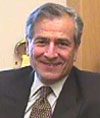 |
Fred Moavenzadeh, Director, MIT Technology and Development Program, who took part in apanel on Systems for Innovation | |
| Subra Suresh, Dean, MIT School of Engineering, whose presentation was entitled: Leading into the Future | ||
| John Parsons; Executive Director, MIT Center for Energy & Environmental Policy Research who took part in a panel on Carbon Management. | ||
For for information, including videos and/or pdfs of the presentations, go to: http://www.mitpanarabconf.org/
Classes Begin at Madar Institute of Science and Technology 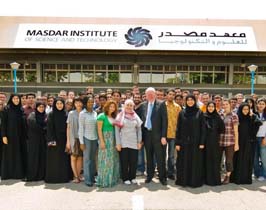
September 6, 2009
The Masdar Institute of Science and Technology commenced classes on September 6, 2009. The students are part of the Madar Institute's two-year Master's program and were selected from more than 1,200 applicants, representing 22 different nations.
Dr. John Perkins, Provost of Masdar Institute (pictured with students, right), said: “Masdar Institute aims to become a world-class university and research institution that will create and shape a new generation of leaders and critical thinkers in science and technology. We are tasked with responding to one of the most important challenges facing our planet – the need to develop sustainable energy solutions that ensure economic growth and prosperity for all nations, without damaging the environment.”
Masdar Institute Press Release (PDF)>
Professor John Perkins Named Provost of Masdar Institute 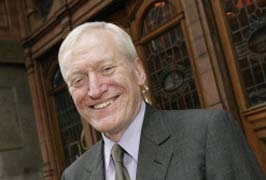
May 2009
Professor John Perkins has been named the Provost of the Masdar Institute of Science and Technology in Abu Dhabi. Prior to joining the Masdar Institute, Professor Perkins led the Faculty of Engineering and Physical Sciences at The University of Manchester, one of four faculties in the new institution created following the merger of UMIST and the Victoria University of Manchester. From 2001-2004 Professor Perkins served as Principal, Faculty of Engineering, Imperial College London. The Faculty of Engineering was created in 2001 as part of a new management structure for the College.
"Masdar City: Zero Carbon, Zero Waste -- Someday Is Today"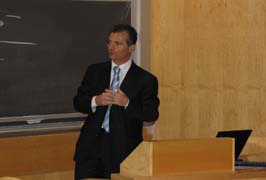
Khaled Awad, Director of Property Development, Masdar Initiative
May 8, 2009
Khaled Awad spoke to MIT students and faculty regarding the Masdar City project -- a six square kilometer sustainable development site that uses the traditional planning principles of a walled city, along with existing technologies, to achieve a zero carbon and zero waste community.
Masdar Institute Joins MIT Energy Initiative 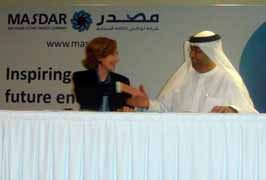
January 19, 2009
The Masdar Institute became the inaugural founding public member of the MIT Energy Initiative. Photo at right: MIT President Dr. Susan Hockfield and Dr. Sultan Al Jaber, CEO, Masdar Initiative at the signing ceremony.
More>
Seminar Calls for UK to Follow Abu Dhabi's Lead on Future Energy
July 8 , 2008Dr. Sultan Al Jaber, CEO of Abu Dhabi's Masdar Initiative, challenged the United Kingdom to follow Abu Dhabi's lead in developing an affordable and sustainable energy future for the world.
Hosted by HRH The Duke of York, Dr. Al Jaber was part of a wider Abu Dhabi delegation, which included HE Kahldoon Khalifa Al Mubarak, Chairman of the Executive Affairs Authority of Abu Dhabi, to address UK government, business, and academic leaders on the issue of sustainable energy at a seminar at Buckingham Palace. Masdar Institute Press Release (PDF) >
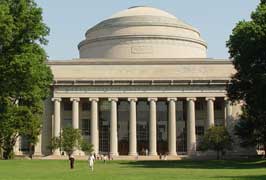
MIT - Masdar Symposium
Abu Dhabi's Strategic Investment in Energy, Infrastructure and Education for the FutureMay 5, 2008
Sponsored by: The Industrial Liaison Program and the MIT Technology and Development Program
Wong Auditorium - Tang Center
MIT and Masdar leaders discussed the shared roles of academia, industry, and government in solving the global challenges of long-term strategic development for alternative energy, sustainable infrastructure technologies, and education. More >
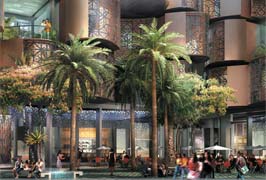 Masdar Institute of Science and Technology:
Graduate Engineering Educational Opportunities in Abu Dhabi
Masdar Institute of Science and Technology:
Graduate Engineering Educational Opportunities in Abu Dhabi
May 6, 2008
Sponsored by: MIT Technology and Development Program
Bartos Theater, Wiesner
Building, E15
12:30 - 4:45
The Masdar Institute of Science and Technology held a session on Academic and Research Opportunities in Alternative Energy and Sustainable Technologies on May 6, 2008. Participants learned about studying at MIST, the curriculum and research, MIT's involvement, and living in Abu Dhabi. MIST faculty were on hand to answer questions.
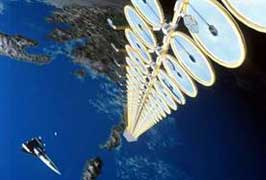 MIT Space Solar Power Workshop
MIT Space Solar Power Workshop
May 14-16, 2007
Sponsored by: MIT Technology and Development Program
Leading experts from industry, government, and academia participated in this two day workshop motivated by the pressing need to develop alternative clean renewable energy supplies. The group agreed that exploring alternative energy sources (wind, hydro-electric, terrestrial solar power, geothermal, and bio-fuels) as well as promoting conservation are high priorities. And it stressed that space solar and existing sources of power are not competitors.
Working groups:
- Space Systems Technology for Space Solar Power
- Solar Energy Technology: Terrestrial vs. Space Solar Power
- Economics, the Environment, Public Policy, and Legal Issues
- Integration Strategies
Each working group discussed many topics, including: the advantages of space solar power, technical unknowns and challenges, what research needs to be done, and what issues are unresolved.
The Future Cannot Be Sustained by Present Technologies
Workshop participants concluded that the United States, Japan, and Europe must take the lead in Space Solar Power, but acceptance and active participation by developing countries is essential. Awareness of Space Solar Power must be increased, a goal this group and others may pursue with future workshops and initiatives.
For list of program committee members and participants, visit: http://web.mit.edu/space_solar_power/index.html
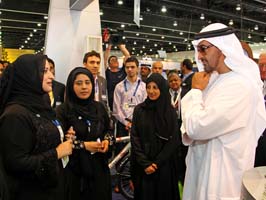 Energy Summit in Abu Dhabi. Among the many
events surrounding the Summit, MIT and Masdar Institute organized a workshop on Strategies for Addressing Carbon Constraints in Commerical Aviation. The Workshop focussed on a "post-Copenhagen" era where environmental constraints and carbon emission resetrictions are likely to have a significant impact on the aviation industry.
Energy Summit in Abu Dhabi. Among the many
events surrounding the Summit, MIT and Masdar Institute organized a workshop on Strategies for Addressing Carbon Constraints in Commerical Aviation. The Workshop focussed on a "post-Copenhagen" era where environmental constraints and carbon emission resetrictions are likely to have a significant impact on the aviation industry.